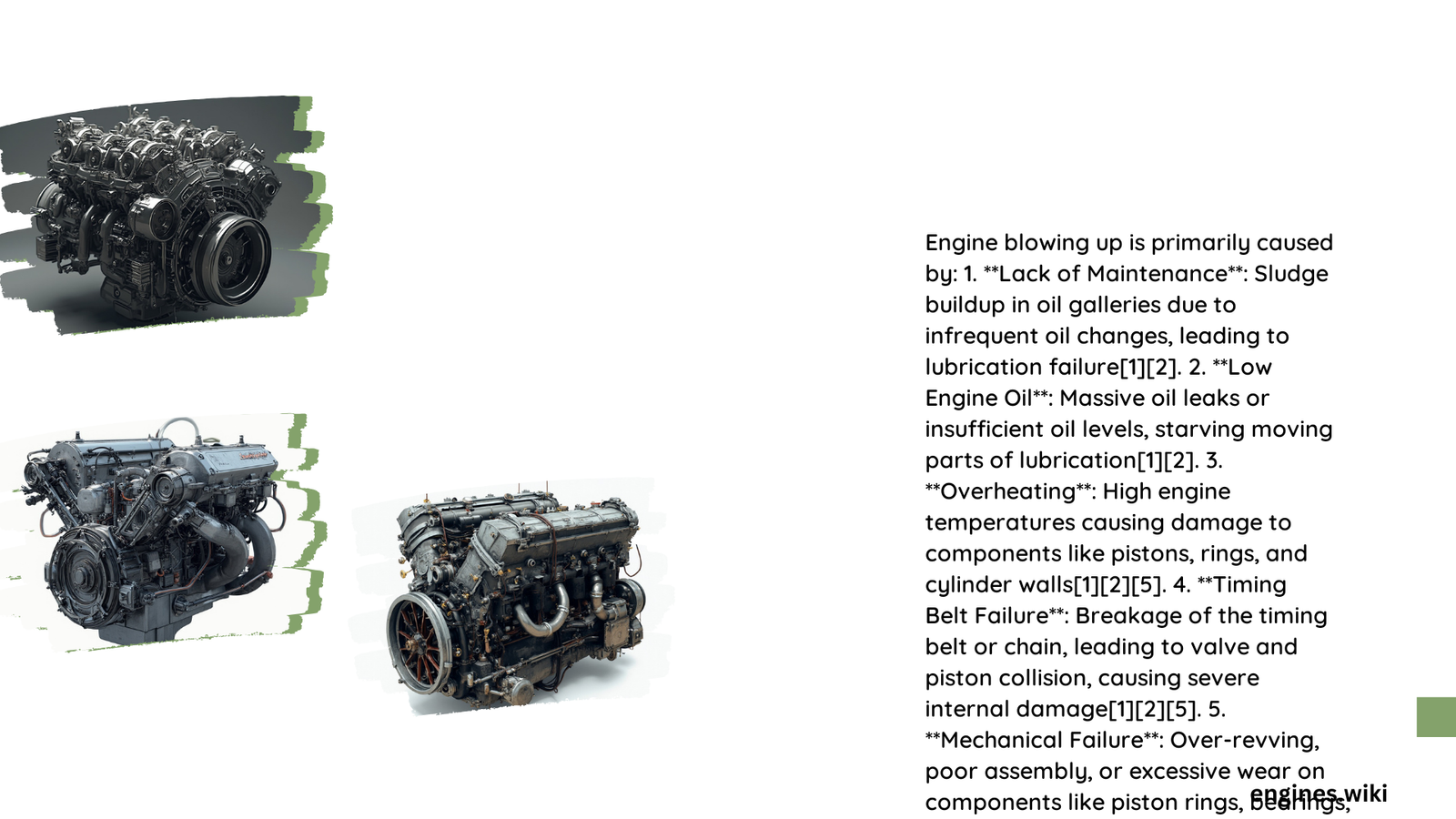Engine blow-ups are catastrophic failures that can result from various factors, including severe overheating, oil starvation, detonation issues, and coolant system failures. These problems often stem from mechanical failures, improper maintenance, or extreme operating conditions. Understanding these causes is crucial for preventing such devastating and costly engine failures.
What Are the Primary Causes of Engine Overheating?
Overheating is one of the most common precursors to an engine blowing up. Several factors can contribute to this dangerous condition:
- Coolant System Failures
- Coolant leaks
- Faulty water pump
- Clogged radiator
- Malfunctioning thermostat
-
Damaged radiator cap
-
Mechanical Issues
- Head gasket failure
- Cracked cylinder head or engine block
-
Stuck exhaust valves
-
External Factors
- Extreme ambient temperatures
- Prolonged high-load operation
Temperature Thresholds and Failure Points
Most engines are designed to operate between 195°F and 220°F. Exceeding these temperatures can lead to:
- Warped cylinder heads
- Damaged pistons
- Cracked engine blocks
- Scuffed exhaust valves
How Does Oil Starvation Contribute to Engine Failure?

Oil starvation is another critical factor that can lead to an engine blowing up. It occurs when engine components don’t receive adequate lubrication, resulting in increased friction and heat.
Causes of Oil Starvation:
- Low oil levels
- Oil pump failure
- Clogged oil passages
- Incorrect oil viscosity
- Extended oil change intervals
| Oil Starvation Factor | Potential Consequences |
|---|---|
| Low oil levels | Increased friction, overheating |
| Oil pump failure | Inadequate oil circulation |
| Clogged oil passages | Restricted oil flow to critical components |
| Incorrect oil viscosity | Reduced lubrication effectiveness |
| Extended oil change intervals | Degraded oil quality and reduced protection |
What Role Does Detonation Play in Engine Blow-Ups?
Detonation, also known as engine knock or pinging, can cause severe damage to engine components and potentially lead to a catastrophic failure.
Key Factors Contributing to Detonation:
- Fuel Octane Rating
-
Using fuel with a lower octane rating than recommended can cause premature ignition.
-
Ignition Timing Issues
-
Advanced timing can lead to fuel igniting too early in the combustion cycle.
-
Carbon Deposits
-
Build-up in the combustion chamber can create hot spots, causing pre-ignition.
-
Excessive Engine Load
-
High-load, low-speed conditions increase the likelihood of detonation.
-
Inadequate Engine Cooling
- Overheating can create conditions favorable for detonation.
How Can Coolant System Failures Lead to Engine Blow-Ups?
The coolant system plays a crucial role in maintaining proper engine temperature. Failures in this system can quickly lead to overheating and potential engine failure.
Critical Components and Their Functions:
- Radiator
- Dissipates heat from the coolant
-
Can become clogged or develop leaks
-
Water Pump
- Circulates coolant through the engine
-
Failure results in inadequate coolant flow
-
Thermostat
- Regulates coolant flow based on engine temperature
-
Can stick open or closed, causing temperature control issues
-
Coolant Hoses
- Transport coolant between engine components
-
Can develop leaks or become brittle with age
-
Radiator Cap
- Maintains system pressure to prevent coolant boiling
- A faulty cap can lead to pressure loss and overheating
Coolant System Pressure and Its Importance:
- Most systems operate at 10-15 PSI
- Increased pressure raises the boiling point of the coolant
- Loss of pressure can lead to coolant boiling and rapid overheating
What Preventive Measures Can Avoid Engine Blow-Ups?
To prevent the catastrophic event of an engine blowing up, consider the following measures:
- Regular Maintenance
- Follow manufacturer-recommended service intervals
-
Address any warning signs promptly (e.g., check engine light, unusual noises)
-
Proper Fluid Management
- Use the correct type and grade of oil and coolant
- Maintain proper fluid levels
-
Change fluids at recommended intervals
-
Monitor Engine Temperature
- Pay attention to the temperature gauge
-
Address any overheating issues immediately
-
Use the Correct Fuel
-
Always use the recommended octane rating for your vehicle
-
Avoid Extreme Operating Conditions
- Be cautious when towing or carrying heavy loads
- Allow the engine to warm up in cold weather
By understanding the causes of engine blow-ups and implementing these preventive measures, you can significantly reduce the risk of experiencing this catastrophic and costly failure.
